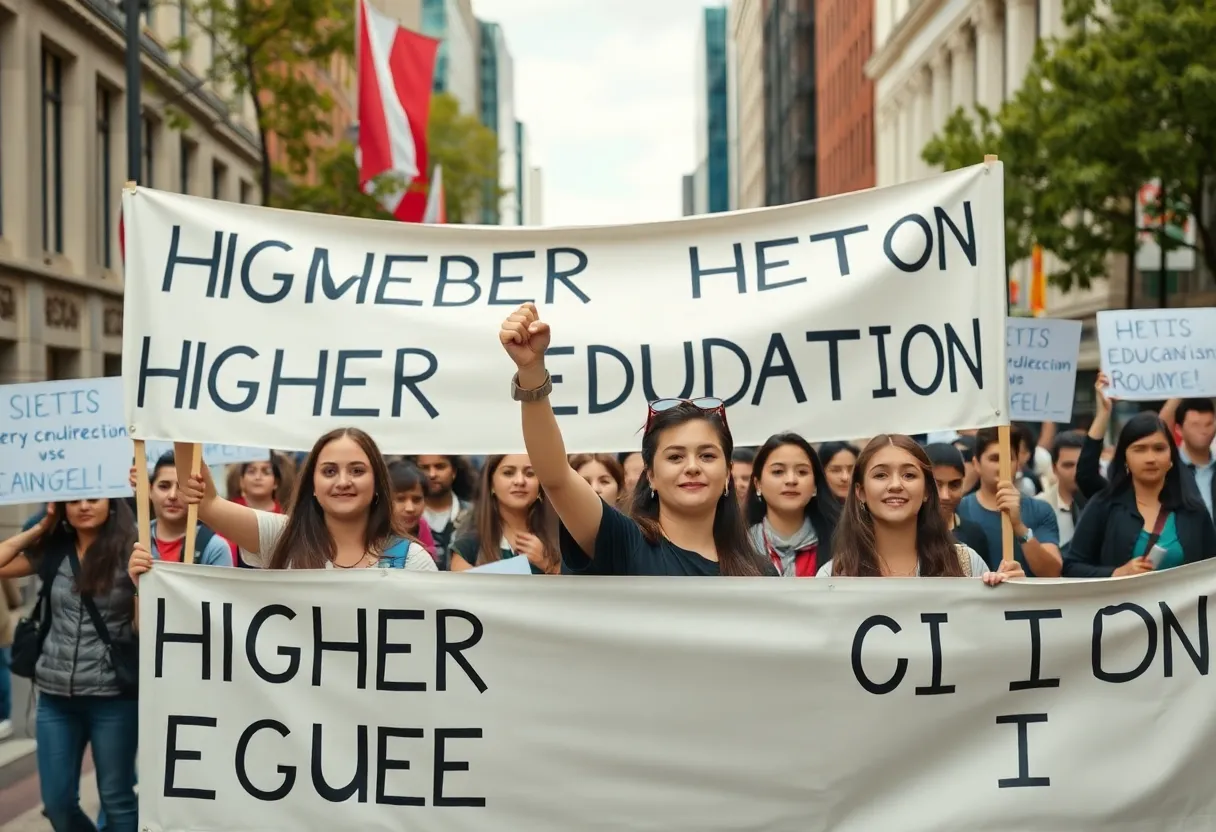News Summary
Students of Rabindra University organized a protest in Dhaka demanding the construction of a permanent campus and the resignation of the Environmental Advisor. Facing prolonged delays in establishing their dedicated building, students expressed frustration over operating from a rented facility for nearly nine years. Their protests included a road blockade and a human chain, echoing deeper concerns about the higher education system’s funding and infrastructure in Bangladesh.
Rabindra University Students Stage Protests in Dhaka Over Campus Delay
Students from Rabindra University held demonstrations on July 27 in Dhaka, expressing their frustration over the prolonged delay in establishing a permanent campus for the institution. The students took their grievances to the streets, blocking the Dhaka-Pabna highway, which led to significant traffic disruptions for commuters in the area.
The protests were primarily sparked by the students’ discontent regarding the lack of progress on the Development Project Proposal (DPP) needed for campus construction. This public university has been functioning in a rented building for nearly nine years, and students feel that it is unacceptable for them to continue their education in such temporary conditions, while other universities have been allocated resources for their permanent campuses.
The unrest intensified following a recent visit by Syeda Rizwana Hasan, the interim government’s Environmental Advisor, to the site planned for the new campus. During this visit, she acknowledged the students’ demands but urged them to be patient, a response that did little to appease the agitated students. They formed a human chain near the Bangladesh Small and Cottage Industries Corporation (BSCIC) bus stand to further highlight their demands.
Protests and Actions Taken by Students
The protests were not an isolated incident; they stem from a series of actions taken by the students culminating in this latest demonstration. On July 26, in a show of solidarity and defiance, students wore black badges and again formed a human chain as a means of protest. They also made the decision to reject the day’s programs that the university offered, emphasizing their dissatisfaction with the administration’s lack of response to their ongoing concerns.
In response to the escalating protests, the university administration promptly decided to postpone examinations for several departments including Bangla, Economics, and Management. This decision highlights the seriousness of the situation and the impact of student activism on university operations.
Funding and Government Response
Reports indicate that a primary concern for the students is the apparent lack of funding from the Muhammad Yunus-led interim government for their campus construction. The students have questioned why their university has faced such financial constraints while other institutions continue to receive necessary support.
The situation has put additional pressure on the government to address the demands of the students who have consistently called for a permanent campus since the university’s establishment. The ongoing protests reflect not only the immediate frustrations about the campus delay but also broader issues regarding educational resource allocation in Bangladesh.
Traffic Impact and Public Response
The protests caused severe traffic congestion along the Dhaka-Pabna highway, further drawing attention to the students’ concerns. Commuters faced significant delays as the road blockade persisted, illustrating how the students’ fight for their rights is impacting everyday life in the area.
As the situation develops, it remains to be seen how the university administration and the government will address the demands of the students. The protests at Rabindra University serve as a reminder of the challenges that many academic institutions face in providing adequate facilities for their student bodies.
The persistent advocacy for a permanent campus is a significant issue for the students, and it underscores the broader struggles within the educational landscape in Bangladesh. With their commitment and solidarity, the students of Rabindra University continue to push for the changes they believe are necessary for their academic and future success.
Deeper Dive: News & Info About This Topic
Additional Resources
- Reuters: Students Protest in Bangladesh
- CNN: Bangladesh Plane Crash Witnesses
- Union Bulletin: Bangladesh Students Protest
- Taipei Times: Bangladesh Protest Coverage
- Hindustan Times: Bangladesh Air Chief’s Plea
Author: Construction CA News
The CALIFORNIA STAFF WRITER represents the experienced team at constructioncanews.com, your go-to source for actionable local news and information in California and beyond. Specializing in "news you can use," we cover essential topics like product reviews for personal and business needs, local business directories, politics, real estate trends, neighborhood insights, and state news affecting the area—with deep expertise drawn from years of dedicated reporting and strong community input, including local press releases and business updates. We deliver top reporting on high-value events such as the Rose Parade, Coachella, Comic-Con, and the California State Fair. Our coverage extends to key organizations like the California Building Industry Association and Associated General Contractors of California, plus leading businesses in technology and entertainment that power the local economy such as Apple and Alphabet. As part of the broader network, including constructionnynews.com, constructiontxnews.com, and constructionflnews.com, we provide comprehensive, credible insights into the dynamic landscape across multiple states.


